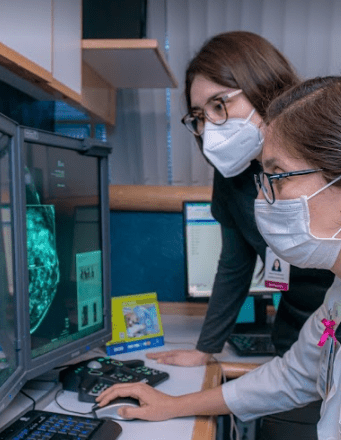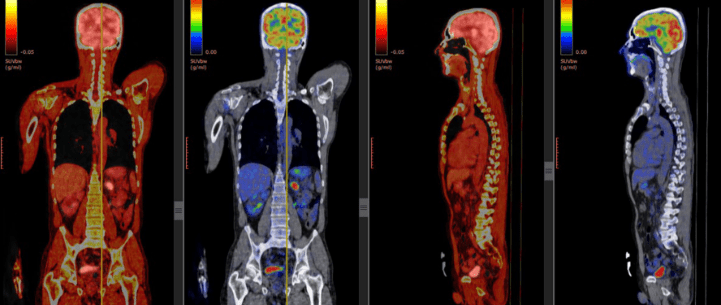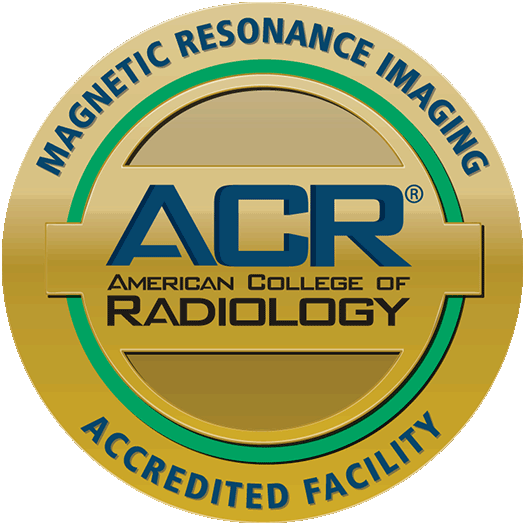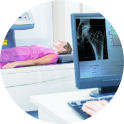Radiology and Molecular Imaging
High technology in the hands of the best experts
In our Radiology and Molecular Imaging department we offer patients an evidence-based care model adapting the best practices in the world to guarantee the highest standards of quality control and safety.
We have radiologist and nuclear physicians certified by their respective councils, collaborating with highly trained radiological technicians and professional administrative staff.
All our studies are carried out under strict quality and safety control in their performance and interpretation, which ensures their value as diagnostic tools.

Why choose our service?
- Multidisciplinary team: highly specialized radiologists in multiple disciplines such as pediatrics, interventionism, breast imaging, molecular imaging, cardiovascular imaging, magnetic resonance imaging, computed tomography, doppler ultrasound, neuroradiology.
- Quality and safety control: all our studies are carried out under strict quality and safety control in their performance and interpretation.
- Technology: we have state-of-the-art technology and the necessary supplies to provide excellence, confidentiality and quality.
- Certifications: We are certified by the American College of Radiology in Mammography and breast tomosynthesis. In bone density we are certified by the Mexican Association of Bone and Mineral Metabolism.
High specialty procedures that are performed in our Radiology and Molecular Imaging department
Diagnostic breast image
It can be done by ultrasound, mammography, and MRI, we have state-of-the-art technology for the diagnosis of breast cancer, offering a humane treatment.
MRI-Guided Breast Biopsy
MRI
Allows obtaining diagnostic images without the use of ionizing radiation, providing great anatomical and functional detail of any area of the human body.
- Multiparametric MRI of the prostate
- MRI (musculoskeletal, whole body, breast, liver, peripheral vascular, advanced and functional studies of neuro, heart)
Ultrasound
With conventional ultrasound images, Doppler, elastography and the use of specific contrast, we carry out a timely and accurate diagnosis.
Vascular and peripheral interventionism
We have state-of-the-art equipment and interventional radiologists to perform catheterizations and minimally invasive procedures for diseases of the vascular system.
PET-CT
Lipid and iron quantification in liver by MR
With the use of our MRI equipment we have the ability to quantify the abnormal accumulation of lipids and iron for its early treatment.
Nuclear medicine
we carry out studies to assess the function of different organs with great precision and comfort for you.
Adults and pediatrics cardiovascular imaging (Nuclear Medicine, MRI, Computed Tomography)
Adults and pediatrics cardiovascular imaging
(Nuclear Medicine, MRI, Computed Tomography)
Computed tomography
We obtain an accurate diagnosis with a multislice equipment that facilitates the creation of 3D images.
Liver fibroscan by ultrasound
It is a new non-invasive method that uses ultrasound to determine the elasticity of the liver, measuring a considerable area of liver tissue.
The fibroscan provides relevant information to physicians to direct treatment in various liver disorders and disfunctions.
It is fast, accessible, non-invasive, and with high sensitivity and specificity.
Interventional Radiology
We have state-of-the-art technology, highly trained physicians, and extensive experience in minimally invasive diagnostic and therapeutic procedures.
Elastography of the Liver by MR
Our high field MRI equipment (3 Tesla) can analyze the hardness of the liver to timely detect tissue fibrosis alterations.
General radiology
Adults and pediatrics cardiovascular imaging
(Nuclear Medicine, MRI, Computed Tomography)
Breast interventionism
We have radiologists specialized in imaging and invasive breast procedures, certified by the Mexican Council of Radiology and Imaging and with extensive experience in performing different types of breast biopsy.
What is Nuclear Medicine?
Nuclear medicine is a specialty that deals with medical diagnosis, treatment, and research, using small amounts of radioactive materials called radiopharmaceuticals (carrier drug and a radioactive isotope) that are generally administered intravenously, inhaled, or orally. The radiopharmaceutical travels through the human body and delivers images based on gamma rays that are detected by a special camera and a computer to create images of the inside of the body, which is why they are also known as gammagrams. Nuclear Medicine provides functional information that cannot generally be obtained using other imaging methods such as X-ray, ultrasonography, computed tomography, or MRI.
It is important to note that radiopharmaceuticals are drugs that generally do not cause side effects, allergies, or kidney damage. Unlike contrast agent, these are inert, since they only trace a biological pathway, without exerting any biological effect.
List of services
performed by Campus
Certifications
ACR Magnetic Resonance
Imaging Accreditation.
Bone densitometry certification by the Mexican
Association of Bone and Mineral Metabolism
RADIOISOTOPE THERAPY
C131 Iodine (thyroid cancer)
I-131 is the classic theranostic (diagnostic/therapeutic) agent, which is useful in the management of thyroid disease.
Its applications range from benign pathologies such as hyperthyroidism and thyroid goiter, its therapeutic principle is based on the destruction of hyperfunctioning glandular tissue or to decrease the size of the thyroid gland. In the case of thyroid cancer, the initial treatment is surgery, later most of the patients require hormone replacement therapy for life. Depending on the clinicopathological characteristics, or if your doctor considers that you have a high risk of recurrence, radioactive iodine can be used after thyroidectomy.
131-MIBG Metaiodobenzylguanidine (Neural crest derived tumors)
MIBG, is an analog of norepinephrine, is marked with I-131, is a theranostic agent (diagnostic/therapeutic), approved by the Food and Drug Administration (FDA), also called iobenguan, and in Mexico known as metaiodobenzylguanidine.
Therapeutic indications include refractory or recurrent high-risk neuroblastoma, inoperable or metastatic pheochromocytoma, paraganglioma, carcinoid tumors, and recurrent or metastatic medullary thyroid cancer.
A special preparation is required which is indicated to patients before administering the therapy.
223 Radium (bone metastasis)
Radium-223 is an alpha-particle-emitting therapeutic radiopharmaceutical, approved by the Food and Drug Administration (FDA) in 2013, with an antitumor effect directed at patients with castration-resistant prostate cancer, with symptomatic bone metastasis, without visceral disease.
Radium-223 works by mimicking calcium (mimic calcium), forming complexes in areas of increased bone turnover, such as bone metastasis. The emission of alpha particles has a short range that gives them a very localized action, which makes it less toxic, affecting healthy bone to a lesser extent. Alpha particles generate multiple DNA double strand breaks, resulting in a cytotoxic effect on bone lesions.
Treatment is administered intravenously and is outpatient; 6 treatments are required, administered every 4 weeks.
177 Lu-DOTATOC
NETTER 1 is a phase 3 study, published in The New England Journal of Medicine, which was considered the pivotal study for approval by the Food and Drug Administration (FDA) in 2018, and its inclusion in the North American Clinical Practice Guidelines in Oncology (NCCN) for well-differentiated gastroenteropancreatic neuroendocrine tumors, this type of therapeutic approach allows achieving a more objective response than conventional therapy.
Neuroendocrine tumors can occur in the digestive system, lung, thyroid gland, adrenal gland, among others, and they have in common the expression of somatostatin receptors, which is a hormone that determines the behavior of this type of cancer, and represents one of the main treatments that can be offered to patients when the disease is unresectable (surgery is not curative ) or metastatic (the disease is found in various organs).
177 Lu-PSMA
It is a widely used therapy in Europe, with a wealth of scientific evidence supporting its use. PSMA (prostate specific membrane antigen) is a receptor that is overexpressed particularly in certain strains of prostate cancer, its biological characteristics allow it to be an ideal target for diagnostic-therapeutic purposes.
Because this radiopharmaceutical binds to specific cells of the prostate or metastatic cells, it gives it its ability to be used as targeted therapy.
Unlike mimic calcium, its therapeutic efficacy is extended to tissues that express this type of receptors, whether nodal, bone or visceral, according to the scientific literature there is a decrease in PSA serum (> 50%).
¡Abrimos nuestra línea de WhatsApp!
Cotiza tus estudios y resuelve tus
dudas sobre facturación.
Horario de atención 24/7.





